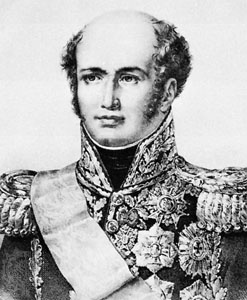Davout, Louis-Nicolas, Duc D'auerstedt, Prince D'eckmühl
French general
born May 10, 1770, Annoux, Fr.
died June 1, 1823, Paris
 French general who was one of the most distinguished of the Napoleonic field commanders.
French general who was one of the most distinguished of the Napoleonic field commanders.Despite his noble origin and his training in the best military tradition of the ancien régime, Davout led his regiment in a pro-Revolutionary revolt (1790). He performed with merit in the Belgian campaign of 1792–93 and gained fame for his attempt to stop the treason of Gen. Charles Dumouriez (April 1793).
Davout rose to the rank of brigadier general but was forced to resign when an edict excluding former nobles from the French armies was adopted in July 1793. He was recalled to service after the overthrow of the anti-aristocratic Jacobins. After accompanying Bonaparte to Egypt (1798–99) he was promoted to the rank of divisional general and in 1801 married Louise-Aimée Le Clerc, Pauline Bonaparte's sister-in-law.
Appointed commander of the elite Third Corps, Davout's talents had a significant impact on the victories at Austerlitz (1805), Auerstädt (1806), Jena (1806), Eylau (1807), Eckmühl (1809), and Wagram (1809). In 1808 Napoleon bestowed the ducal title, and the next year Davout was made prince d'Eckmühl.
Davout performed admirably in the unsuccessful Russian campaign (1812–13) and then recaptured Hamburg. When Bonaparte fell in 1814 Davout retired, but he returned to the imperial cause during the Hundred Days as minister of war. After the defeat at Waterloo, Davout signed the Paris Convention (July 3, 1815), which opened Paris to the victorious allies. He retained command of the remnants of the imperial army in the Loire valley until a final peace was arranged. He refused to swear allegiance to the restored Bourbons until August 1817, after which he was recognized as a peer of France and confirmed in his honours and titles.
- Townshend, Charles
- Townshend, Charles Townshend, 2nd Viscount
- township
- Townsville
- Towson
- Towton, Battle of
- toxaphene
- toxemia of pregnancy
- toxicology
- toxic shock syndrome
- toxin
- Toxodon
- toxoid
- toxoplasmosis
- toy
- Toyama
- Toynbee, Arnold
- Toynbee Hall
- Toynbee, Philip
- Toyohashi
- Toyokawa
- Toyonaka
- Toyota
- Toyota Motor Corporation
- Toyotomi Hidetsugu